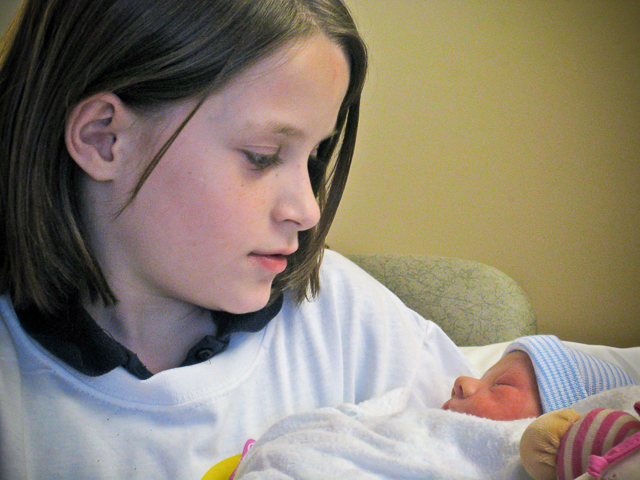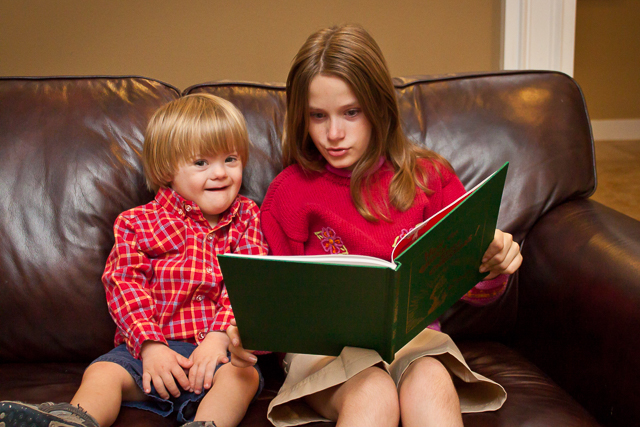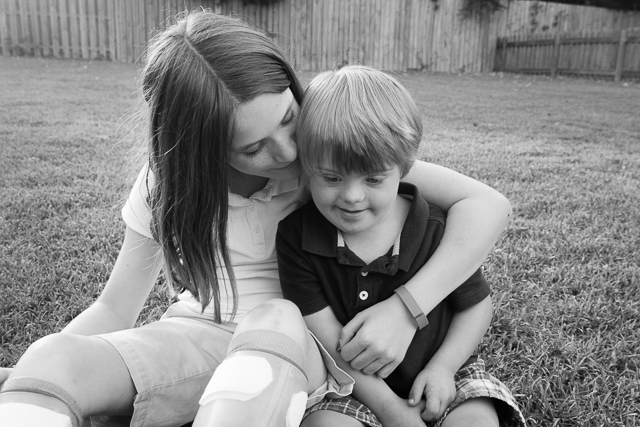Today’s post is about an important topic to me (and likely to many of you) – future planning for individuals with disabilities in light of 2014’s Achieving a Better Life Experience (ABLE) Act – and is sponsored by ABLEnow.

I shared Nathan’s birth story here a few years back, and one of the things that I talked about is how I was not devastated by his diagnosis of Down syndrome, because I had feared something much worse. What I didn’t share at the time, though, is the thoughts that DID haunt me during those early days. The one worry that kept me up at night was this: will Sarah Kate be forced to care for her brother when I am old (or gone), and is that unfair to her?
When Sarah Kate was born, Mr. Andi and I opened a 529 college savings plan for her. Through a combination of our parents’ contributions, scholarships, and co-op opportunities, we were both able to graduate from college without any student loan debt, and we wanted the same thing for Sarah Kate. We knew that a conventional college path was unlikely for Nathan, so we turned to our financial advisor for help with planning for Nathan’s future. I was stunned to discover that while we could open a tax-exempt savings plan for Sarah Kate’s future college expenses, we couldn’t do the same thing for Nathan’s basic future needs.

It’s true that some adults with Down syndrome go to college, live independently, hold down jobs, and even start their own companies. It’s encouraging to know that more opportunities exist for adults with Down syndrome than ever before in history. But if you’ve ever spoken to the family members of adults with Down syndrome (or watched a single episode of Born This Way), you know that 100% independence without support is highly unlikely – and support comes with a cost.
In an ideal world, Mr. Andi and I would have more money than we could spend and could provide for every possible need or want that Nathan might ever have – and other families of kids with disabilities would be able to do the same. But that’s not the real world. In the real world, safety nets such as Medicaid and SSI exist, but the primary responsibility for support for individuals with disabilities – financial and otherwise – lies with their families. And the real kicker? Individuals with $2000 or more in financial resources (which could include cash savings, retirement funds, and items of significant value) weren’t eligible for those benefits at all.

Basically, we were on our own. The earnings off of any savings plan we created for Nathan would not only be taxable (unlike his sister’s college savings plan), but the very existence of the plan would prevent him from receiving services he might desperately need, like healthcare.
Fortunately, in 2014, the Achieving a Better Life Experience (ABLE) Act was passed by Congress and signed into law. The ABLE Act amended Section 529 of Internal Revenue Service Code of 1986 to allow the creation of tax-free savings accounts for individuals with disabilities that are available to cover qualified expenses such as education, housing, and transportation, and doesn’t impact the benefits the individual can receive through private insurance, Medicaid, SSI, or the individual’s employment.
For those of us in the trenches of the special needs world in 2014, this news was a Really Big Deal. The ABLE Act brought to the forefront the extra and significant costs of living with (or raising a child with) a disability, and offered a real-world financial opportunity to families like ours. It meant that if one day Sarah Kate had primary responsibility for providing support to her younger brother, she wouldn’t have to be saddled with financing that support, too. We can prepare financially for him now in the same way that we prepared for her college expenses – and grandparents, aunts, uncles, or anyone else who wants to contribute can do so easily.

Although ABLE accounts are available through programs in a number of states, Virginia was the first to jump on board, spurred to action by a group of parents in Virginia who first conceived the idea of the ABLE Act. This early adoption has led to Virginia’s ABLEnow becoming one of the country’s fastest-growing ABLE Act programs, and it is available to individuals in any U.S. state. NOTE: The ABLE National Resource Center offers a helpful comparison tool for state ABLE programs: ablenrc.org.
Almost eight years on, I’m no longer concerned about saddling my daughter with the “burden” of her younger brother. It didn’t take long for me to realize that I didn’t need to worry about who would take care of Nathan, because Sarah Kate demonstrated early on that she adores him and is willing to do whatever it takes. Just a few months ago, she talked about having him to come to live with her when she graduates from college and gets a job, which would be before he is even an adult. I reassured her that barring a catastrophe, her dad and I plan to keep him with us for many years. 😉 But it does give me peace of mind to know that if that day comes, we’ll have been able to do our part financially to support them both.
For more information on ABLEnow, watch the brief video below or visit ABLEnow.
Other resources for information about the ABLE Act and ABLEnow:
- ABLEnow FAQS: https://www.able-now.com/resources/faqs
- ABLEnow Customer Service: https://www.able-now.com/about-ablenow/contact
Thank you, ABLEnow, for sponsoring today’s post. I was enthusiastic about accepting this opportunity because future financial support for Nathan is an important issue for our family.

My three older girls have also started talking about who gets their little sister when the time comes. They are much more aware of the future than I was at their ages! Their best idea yet is that they’ll time share her. They will each get her for four months a year. 🙂 I’m sure when the time comes they’ll all work something out but I’m hopeful that will be a LONG way away.
I met a family recently who is doing exactly that! The parents died and now the sister with Down syndrome rotates time with each of her siblings.
Andi, the ABLE Act is a good thing. It helps take care of many financial aspects of disability which will have to be dealt with when our parents age and when we need it. I am glad this lightens a lot of load with Nathan when you and Mr. Andi are gone, and Sarah Kate is his carer. And she’s very independent, and very close to her brother. That bond is priceless. And is genuine and strong.
Andi,
Nathan is valued in my book as much as Sarah Kate is, and college is not the only thing. Nathan’s quality of life matters, and he has his needs equally. I enjoyed college, but also had my Grandmother (no longer with me, much missed) and also my employer’s needs to deal with. A lot of responsibility. You’re awesome, and your knowledge of late on this subject is valued. And helpful, as I will need to deal with my stepfather’s estate and how it will affect my insurance, and I need to allow for future needs and staying independent with age and mobility issues which affect how I access my world and the pace I deal with my world, and my home’s needs and my own. CP is never easy, nor is owning any challenge of physical or other kind. You are thinking very well with Mr. Andi about your family’s future. And needs of your Son and Daughter. I am also glad you’re treating them as equals, Stepdad didn’t with me. Mom’s my best ally.